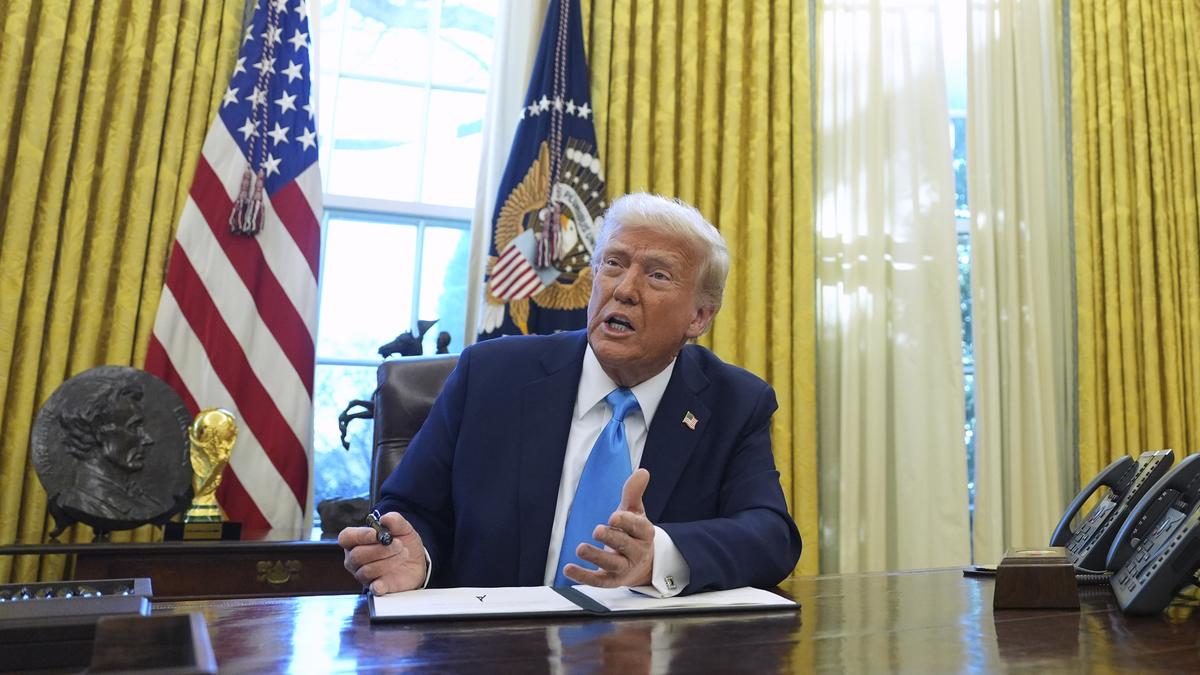
What will be the impact of Trump’s trade war? | Explained
The Hindu
US President Donald Trump's tariff plan to curb illegal migration and drugs sparks global trade tensions, risking inflation and economic growth.
The story so far: U.S. President Donald Trump has sought to deliver, in the early days of his second term in office, on his most vociferous campaign promise — to slap a range of the U.S.’s trading partners with significant tariffs in a bid to tamp down on undocumented migrant and illicit drug inflows, while presumably incentivising companies to favour creating jobs on U.S. soil. His administration’s initial action in the space, to use executive orders to impose a 25% tariff on Canadian and Mexican goods and a 10% tax on energy products from Canada and a wide range of goods from China, roiled stock markets across the world, especially in Asia.
Editorial | Tariff turmoil: on Trump and punishing tariffs on trade
As Beijing vowed to file a lawsuit with the World Trade Organization against the U.S. for “wrongful practice” and Ottawa and Mexico City announced plans for retaliatory tariffs, Mr. Trump appeared to back down from his position. Following discussions with Mexican President Claudia Sheinbaum and Canadian officials, Mr. Trump said the White House had agreed to “pause” the tariff action for a month in the wake of Mexico committing 10,000 National Guard troops to man its northern border and a longer-term bilateral deal in the works. Similarly, a 30-day pause on tariff action would be applied to Canada given its Prime Minister Justin Trudeau’s commitment to “work together” as his government sought to appoint “a fentanyl czar, list Mexican cartels as terrorist groups and launch a Canada-U.S. Joint Strike Force to combat organised crime, fentanyl and money laundering.”
While the tariffs on Chinese goods are in force, Mr. Trump temporarily exempted small-value packages imported from there after the U.S. postal service was plunged into chaos as it struggled to deal with new regulations.
Although in the traditional macroeconomic policy context, tariffs are imposed to rectify trade imbalances due to artificial price barriers, the justification given by the Trump White House for their tariff plan was that it would address the “national emergency” resulting from “the extraordinary threat posed by illegal aliens and drugs, including deadly fentanyl.”
This expansive reasoning for imposing tariffs across the board potentially risks blowback from other nations’ inevitable retaliatory tariffs. The resulting trade war could seriously dampen world trade at a precarious time for global economic growth prospects. The irony is that escalating tit-for-tat tariffs will likely exert strong upward pressure on the prices that U.S. consumers pay for imported products, and ignite a broader inflationary trend through higher input prices across industries.
The second cause for concern of the Trump administration’s tariff plan is that it tacitly endorses the weaponisation of tariffs as a countermeasure against unrelated inter-country disputes — in this case the inflow of unsanctioned migration and illegal drugs — rather than rely on traditional law enforcement activity to ensure less porous borders.













